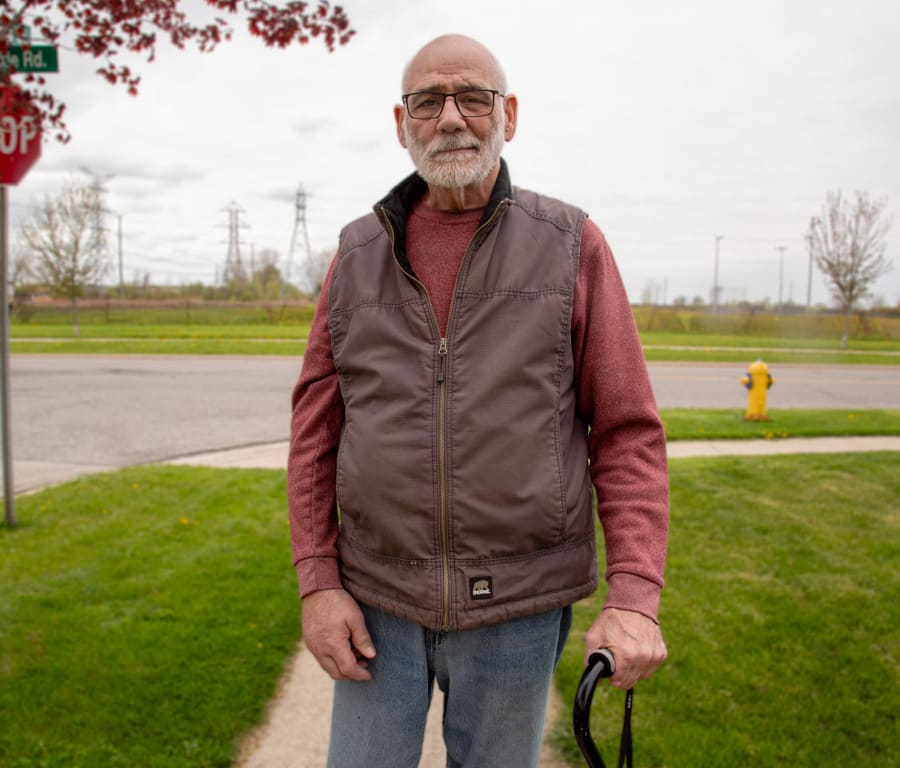This is an opinion column by Niagara Health Communications Specialist Tiffany Mayer, published in the St. Catharines Standard, Niagara Falls Review and Welland Tribune.

Jack Gill is making an incredible recovery after having a stroke in January, with credit going to his resilience and the care he received from Niagara Health's stroke team.
There’s a sure-fire way to offend Jack Gill: Take pity on him.
It may take him longer to put on his jacket and zip it up these days but, rest assured, the retired police officer will do it.
Getting back to his west-end home from his daily breakfasts with friends downtown is also more marathon than sprint right now. The journey includes walking more than a kilometre from the bus stop, resting on green metal utility boxes along the way and leaning on a cane for support. But he gets there.
Down the road, Gill, 69, is confident he’ll once again drive that route himself. His ultimate goal is doing it on his motorcycle.
Gill has already come a long way since suffering a stroke in early January. But he knows there’s more healing and recovery to happen before life returns to what it was.
“I don’t like sitting still,” Gill said. “I like doing things and that’s three-quarters of the battle right there.”
That battle started in the early hours of Jan. 5. Gill’s wife, Micheline, who’s a light sleeper, was disturbed by his frequent yawning in bed next to her.
After finally drifting off, Micheline woke to find Gill lying awkwardly. She asked what was happening.
“Come here,” Gill struggled to say as he slid onto the floor.
Micheline took his face in her hands and saw the telltale drooping.
“I knew right away,” Micheline said.
She called 911. After paramedics conducted a pre-hospital stroke assessment, Gill was transported to the Niagara Falls Hospital, home of Niagara Health’s Stroke Centre of Excellence.
He arrived at the hospital with slurred speech and weakness on his right side. A CT scan revealed a blood clot in his brain. The Niagara stroke team promptly consulted with specialists in Hamilton through CritiCall, a service that enables greater access to emergent care.
“Timely care is critical with stroke. Time is brain. We’ve built this system together and we will continue to be evaluated by Accreditation Canada.”
Gill was transferred to Hamilton Health Sciences soon after for endovascular clot retrieval (EVT) and a stenting procedure. Within 24 hours, he returned to the Niagara Falls Acute Stroke Unit to continue receiving care close to home.
“Patients who qualify for EVT have many different issues. In some cases, they can’t move on one side of their body, or their speech, language and vision may be affected,” said Leanne Kent, Niagara Health District Stroke Program Manager. “But because he got to Hamilton so quickly and was able to have this life-altering procedure, he has the potential for improved outcomes.”
On Jan. 15, Gill, known as Jack the Invincible to Micheline’s friends, was discharged to Hotel Dieu Shaver Health and Rehabilitation Centre for intensive stroke rehabilitation therapy. He quickly made friends with patients and staff and came to prefer his meals from the cafeteria rather than served bedside.
“Everything was great,” Gill said about the care he received. “I got to know the people in the hospital. I can’t give enough praise to these people.”
Gill’s care – from that first call to paramedics, to co-ordinated treatment in Niagara and Hamilton, to rehabilitation – demonstrates why Niagara Health is participating in Accreditation Canada’s Stroke Distinction program.
The distinction recognizes Niagara Health as a provincial leader in providing outstanding stroke care and provides feedback on how to continue developing the program, which also has input from stroke survivors, caregivers, patient partners and the Central South Regional Stroke Program.
Niagara Health is also working to achieve Integrated Stroke Distinction for its partnerships with Hamilton Health Sciences, Hotel Dieu Shaver and the Waterloo Regional Health Network.
“Awarding Stroke Distinction instills confidence in patients, in primary care physicians, and the community, to know that they’re going to get the care they need in a timely way,” Kent said. “Timely care is critical with stroke. Time is brain. We’ve built this system together and we will continue to be evaluated by Accreditation Canada.”
Gill’s story highlights the impact of getting the right care quickly – along with his own resilience and role in getting better. He no longer needs his cane to get around at home. His speech is nearly back to what it was. Gill still experiences some brain fog and has trouble recalling names, but he continues to improve the farther he gets from Jan. 5.
“As long as he remembers my name,” Micheline said with a laugh.
Gill checks in regularly with his neurologist and is waiting for a spot in the Hotel Dieu Shaver outpatient rehabilitation program. In the meantime, he sticks to those daily breakfasts with friends and his walks – and a gentle but firm rebuke of anyone who tries to help too much.
There’s also that one prize he refuses to take his eye off: the independence that will come when he’s well enough to get his driver’s licence reinstated.
“Right now, the only thing I’m looking forward to is getting into my truck and going places,” he said.

